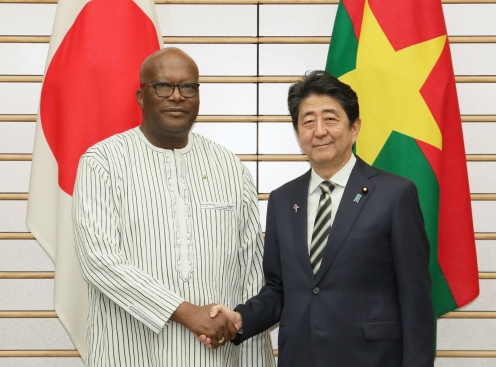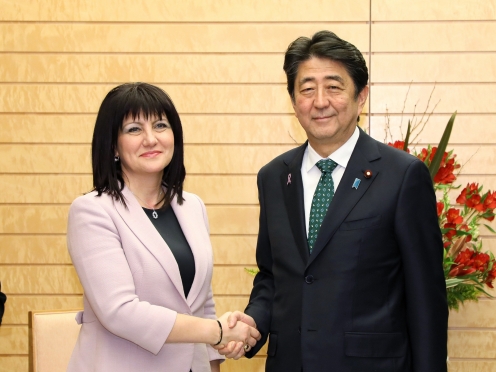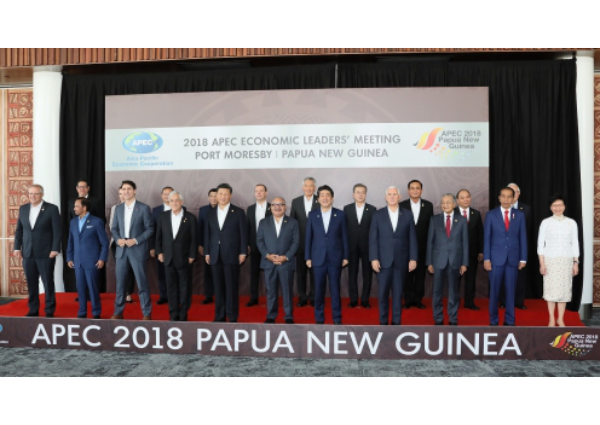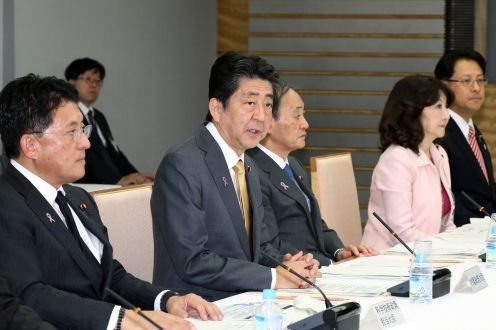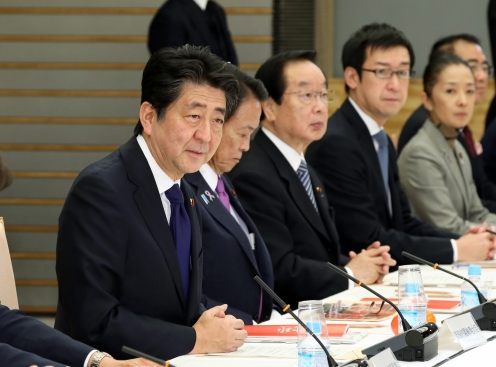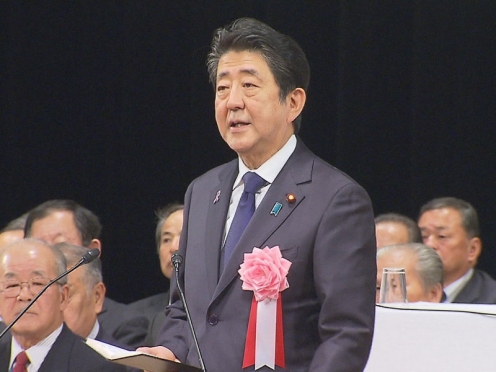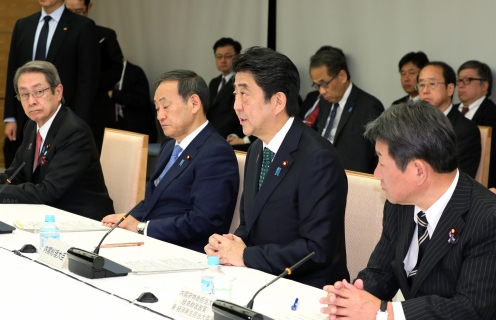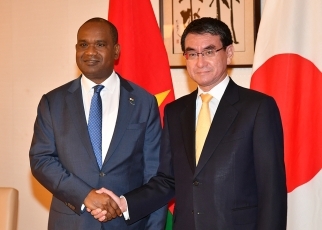Japan-Burkina Faso Summit Meeting and Other Events
Cabinet Secretariat, Monday, November 19, 2018
[Provisional Translation]
On November 19, 2018, Prime Minister Shinzo Abe held a summit meeting and other events with H.E. Mr. Roch Marc Christian Kabore, President of Burkina Faso, at the Prime Minister’s Office.
The two leaders attended a salute and guard of honor ceremony, followed by a summit meeting. Afterwards, the leaders held a signing ceremony and a joint press announcement.
Courtesy Call from the President of the National Assembly of the Republic of Bulgaria
Cabinet Secretariat, Tuesday, November 20, 2018
[Provisional Translation]
On November 20, 2018, Prime Minister Shinzo Abe received a courtesy call from Ms. Tsveta Karayancheva, President of the National Assembly of the Republic of Bulgaria, at the Prime Minister’s Office.
APEC Economic Leaders’ Meeting and Other Events: Second Day
Cabinet Secretariat, Sunday, November 18, 2018
[Provisional Translation]
On November 20, 2018, Prime Minister Shinzo Abe received a courtesy call from Ms. Tsveta Karayancheva, President of the National Assembly of the Republic of Bulgaria, at the Prime Minister’s Office.
Council for Science, Technology and Innovation
Cabinet Secretariat, Thursday, November 22, 2018
[Provisional translation]
On November 22, 2018, Prime Minister Shinzo Abe held the 40th meeting of the Council for Science, Technology and Innovation at the Prime Minister’s Office.
At the meeting, discussion was held on basic research capacity development and high-risk research, and the inquiry and response on the Guidelines on the Handling of a Specified Embryo, as well as the results of the evaluation of the research and development projects of national importance.
Based on the discussion, the Prime Minister said,
First, I would like to offer my congratulations once more to Dr. Honjo on his winning of the Nobel Prize in Physiology or Medicine. Dr. Honjo’s research gives hope to many people suffering from cancer throughout the world, and I feel great pride as a fellow Japanese.
Today, Dr. Honjo spoke very candidly about the importance of basic research, and I strongly reaffirmed the importance of creating opportunities for young researchers to take on challenges.
In June, the Government approved the Integrated Innovation Strategy by a cabinet decision. In this strategy we have included various measures such as prioritization of the allocation of research grants among young researchers, and the introduction of incentives aimed at the increased use of external research funds, as well as the increased mobility of university personnel by expanding the introduction of the annual salary system. In this way, we will enhance the research environment with a focus on promising young researchers.
To connect basic research with social change, the strategy also includes measures to utilize a ‘Moonshot’ type R&D system that seeks to achieve challenging, ambitious targets.
I ask that Minister Hirai, Minister Shibayama and other relevant ministers steadily implement these measures included in the Integrated Innovation Strategy, through the budget formulation process, which is now getting fully underway, and other means, so as to strongly support the efforts of young Japanese researchers following in the footsteps of Dr. Honjo.”
Council on Overcoming Population Decline and Vitalizing Local Economy
Cabinet Secretariat, Wednesday, November 21, 2018
[Provisional Translation]
On November 21, 2018, Prime Minister Shinzo Abe held the 16th meeting of the Council on Overcoming Population Decline and Vitalizing Local Economy in Japan at the Prime Minister’s Office.
At the meeting, discussions were held on the revision of the comprehensive strategy for overcoming population decline and vitalizing local economy, and on best practices in regional revitalization.
Based on the discussion, the Prime Minister said,
“Today, we heard from Ms. Ogata, Mr. Hotta, and Mr. Saito, who work hard on the frontlines in local communities.
After listening to the three speakers today, I felt the significant differences between those who feel that it is in their communities that opportunities can be found, those who feel that there are no opportunities in their communities, those who feel that they can seize the opportunities in their communities themselves, and those who feel that they cannot do so.
It is in the regions that opportunities can be found. The combination of those who think this way and migrate to respective regions from outside, bringing new ideas with them, and those who know the local communities very well, will set off chemical reactions that generate new dynamism in the regions and potential for future growth. That is what I felt anew today.
In the Basic Policy for Overcoming Population Decline and Vitalizing Local Economy 2018 formulated in June, we adopted a policy package aimed at providing strong supports to start businesses or work through U-turns (from their hometown in a local district to a city and back), I-turns (from their hometown in a local district to a different local district) and J-turns (from their hometown in a local district to a nearby city) as well as offering opportunities for motivated women, elderly persons, and people from abroad to fully utilize their capabilities. In order to create a steady flow of people to each region, we plan to launch a new scheme from the next fiscal year.
With regard to discussions over community building including urban development in central and core cities, I would also like the Council to conduct a thorough review on concrete measures for resolving various issues.
Towards the revision of the comprehensive strategy at the end of this year, I ask all the ministries to work together as one to advance reviews under the leadership of Minister Katayama.”
National Convention of the Chairpersons of Town and Village Assemblies
Cabinet Secretariat, Wednesday, November 21, 2018
[Provisional Translation]
On November 21, 2018, Prime Minister Shinzo Abe attended the 62nd National Convention of the Chairpersons of Town and Village Assemblies held in Tokyo.
The Prime Minister said in his congratulatory address,
“I express my most heartfelt congratulations upon the successful opening of the 62nd National Convention of the Chairpersons of Town and Village Assemblies today.
I would also like to express my profound respect for the chairpersons of town and village assemblies, who work tirelessly every day for the development of local communities and the improvement of residents’ welfare as the closest representatives of the residents.
When I entered this venue today, I felt that there was considerably greater applause from this side of the hall. It turns out that they are from my hometown of Yamaguchi Prefecture. Next to them are attendees from Wakayama Prefecture, which is the hometown of Minister for Internal Affairs and Communications Ishida. Seated two sections behind Yamaguchi Prefecture are attendees from Aomori Prefecture, hometown of Speaker of the House of Representatives Tadamori Oshima. On this side we have the attendees from Hokkaido, hometown of President of the House of Councillors Chuichi Date. This is precisely the kind of consideration, as well as method of applying pressure, that only the National Association Chairpersons are capable of. I am renewing my resolve to maintain and develop this beautiful Japan, working together with all of you from the towns and villages that are maintaining the beauty of Japan.
There is no doubt that it is in the regions that opportunities can be found. It is important to create attractive regions that make young people feel this way and want to join them. Kawakami Village in Nara Prefecture, which is renowned for Yoshino cedar, is one of the villages that is experiencing serious depopulation. More than half of the Regional Vitalization Cooperation Volunteers who moved to this village from urban areas, with a strong desire to change their living environments and drawn by its appeal, settled down there after completing their term as volunteers. They are now active members of the community by operating eco-tours and farm stays, which take advantage of the local forests, a unique feature of the village, which help preserve water resources and are characteristic of the region. To spread this trend across the whole of Japan, we aim to provide strong support for U-turns (from one’s hometown in a local district to a city and back), I-turns (from one’s hometown in a local district to a different local district) and J-turns (from one’s hometown in a local district to a nearby city) by young people who feel that it is in the regions that opportunities can be found, including the expansion of the Regional Vitalization Cooperation Volunteers initiative. To maximize the unique appeals of each region, such as lush natural environments and distinctive regional specialties, we will exert every effort to provide a strong boost for the enthusiasm and unique creativity of the regions such as the 100-billion-yen Regional Revitalization Promotion Grant.
The Abe Cabinet adheres to its fundamental position that Japan will not have vitality unless its regions do raise the banner for regional revitalization, which enters its fifth year, higher than ever before.
This summer, various parts of Japan suffered severe damage in the wake of successive natural disasters, including the earthquake in the northern part of Osaka, the heavy rains in western Japan in July, Typhoon No. 21,* and the Hokkaido Eastern Iburi Earthquake. Using the supplementary budget, we will accelerate disaster recovery, and implement measures with the highest priority, such as safety measures for concrete walls to protect the lives of our children, and the installation of air-conditioning units in public elementary and junior high schools across Japan as a countermeasure to heatstroke. Furthermore, I have just instructed the commencement of work to formulate the second supplementary budget in order to meet the needs of our citizens. To further promote the building of safe communities, we will implement emergency measures intensively over the next three years for disaster prevention and disaster mitigation, as well as the building of national resilience, including the development of infrastructure in response to the rapidly changing weather conditions in recent years.
The greatest challenge facing Japan is the declining birthrate and the aging of society. We will tackle this challenge head-on, and advance reforms over the next three years to establish a social security system that can bring peace of mind to all generations, from children to the working generation and the elderly.
I would like to conclude my address on the occasion of the National Convention of the Chairpersons of Town and Village Assemblies by extending my best wishes for the continued progress of the National Association Chairpersons of Town and Village Assemblies, as well as the further success of everyone in attendance today.”
*Typhoon Jebi
Meeting of the Council on Economic and Fiscal Policy
Cabinet Secretariat, Tuesday, November 20, 2018
[Provisional Translation]
On November 20, 2018, Prime Minister Shinzo Abe held the 14th meeting of the Council on Economic and Fiscal Policy in 2018 at the Prime Minister’s Office.
At the meeting, a discussion was held on future economic and fiscal management, as well as local public administration and finance, and social security, two of the thematic topics of the Integrated Economic and Fiscal Reforms.
Based on the discussion, the Prime Minister said,
“Today, we first held an intensive discussion on future economic and fiscal management. As we discussed at the previous meeting, despite the sound fundamentals of the Japanese economy, we need to carefully monitor the future outlook of the global economy and firmly sustain the recovery trend of the economy, in advance of the raising of the consumption tax rate next year. Taking these circumstances into consideration, I have today instructed that the second supplementary budget be formulated. I also plan to incorporate sufficient consumption tax-related countermeasures into the initial budget for the next fiscal year.
I would like Minister Motegi to take firm measures based on today’s discussions to reinforce the current economic recovery and realize sustainable economic growth by enhancing our growth potential through means such as improvements in productivity, investment in human resources and the building of national resilience.
With regard to local public administration and finance, amid the progression of the declining population and the aging of society, it is important to make the transition to a sustainable system. In this respect, I would like Minister of Internal Affairs and Communications Ishida, together with the relevant ministries and agencies, to take proactive steps toward expanding the coverage of public services, and extending the digital transformation of local public administration across the whole of Japan.
The key to resolving the challenges faced by the regions lies in utilizing private-sector funds and knowhow for public services. I would like to ask Minister of State for Regional Revitalization Katayama to take proactive measures toward regional revitalization based on today’s proposals.
With regard to social security, in addition to formulating the budget for next fiscal year in line with the New Plan to Advance Economic and Fiscal Revitalization, I would like Minister of Health, Labour and Welfare Nemoto to steadily advance measures of immediate priority including preventative care and health promotion, through visualizing ongoing initiatives and their results, setting KPIs, and collaboration among insurance companies, and other means. Minister Nemoto has also swiftly reviewed career development subsidies. I ask for his continued efforts in spreading and promoting the system so that it is utilized more broadly.”
Japan-Burkina Faso Foreign Ministers’ Meeting
Foreign Affairs, Monday, November 19, 2018
On November 19, commencing at approximately 3:05 p.m. for around 30 minutes, Mr. Taro Kono, Minister for Foreign Affairs, held a foreign ministers’ meeting with H.E. Mr. Mamadou Alpha Barry, Minister of Foreign Affairs of the Republic of Burkina Faso, who is accompanying His Excellency Mr. Roch Marc Christian Kaboré, President of Burkina Faso, on the president’s official visit to Japan. The overview of the meeting is as follows.
1. Minister Kono welcomed his reunion with Minister Barry after the two ministers met last October on the occasion of the TICAD ministerial meeting and stated that the realization of the president’s official visit to Japan is delightful, and that Japan emphasizes its relationship with Burkina Faso, which has been making efforts to ensure peace and stability in the region. Minister Kono also stated that he would like to exchange views on a broad range of fields toward the Japan-Burkina Faso Summit Meeting and develop bilateral relations further going forward. In response, Minister Barry expressed gratitude for his invitation to Japan this time and Japan’s support for the security field and the development issues of Burkina Faso.
2. The two ministers reaffirmed that Burkina Faso has played an important role in the project on the Corridor Development for West Africa Growth Ring and that Japan will contribute to the reinforcement of regional connectivity and the sustainable growth of Burkina Faso through developing quality infrastructure. The two ministers also reaffirmed the necessity of improving the business environment to further promote Japanese companies’ investment, taking the opportunity of the Japan-Burkina Faso Business Forum, which was successfully held, and the role of education and vocational training as the basis of nation building and economic and social development. The two ministers also welcomed the signing of the Japan-Burkina Faso Technical Cooperation Agreement. In response, Minister Barry stated his expectation on Japan’s continuous support in road construction projects and education. Furthermore, the two ministers confirmed their cooperation for the success of the seventh Tokyo International Conference on African Development (TICAD7).
3. In addition, the two ministers exchanged views and affirmed their collaboration on issues such as cooperation in the international arena, including United Nations Security Council (UNSC) reform.

























